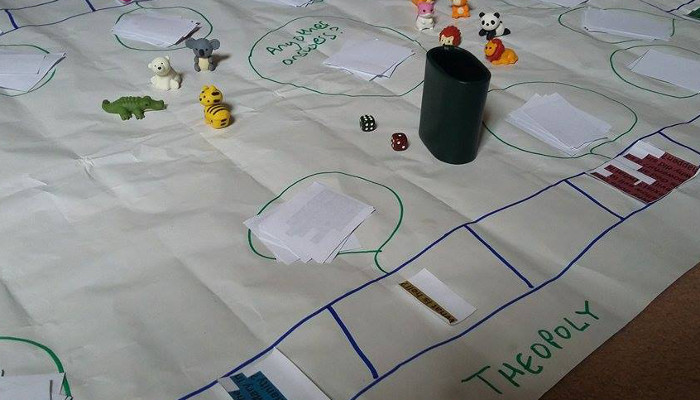The Vice Provost, Cedric Blakey has devised a game to enable small groups talk about God. In this week’s article explains why he did it and how it works.
I have found an astonishing interest and energy for enquiry about God in Glasgow. The following were just a few of the questions asked by the God Factor course group earlier this year:
- Does God exist? Who created God?
- What does God look like/ feel like?
- Why does God allow and permit evil to exist?
- Is God a man?
- Does God ever change?
How can we initiate exploration of these kinds of questions, and enable discussion about God?
I have devised a game called Theopoly. Depending on the size of the group it can be played competitively with dice, or collaboratively standing round a table. The aim is to achieve, not riches and capitalist property owning domination, but ideas, arguments from a community chest of possibilities.
There is a ‘board’ with squares round the four sides, as in a Monopoly board, and a set of animal characters for participants to identify themselves. On some of the squares are placed the questions asked by the group. Players choose a symbol and in the collaborative version of the game, then walk round the table placing their symbol on the square that most interests them.
By each question there is a set of possible answers, placed upside down on separate squares of paper. Each participant then takes turn to read out their chosen question and to turn over the possible answers, reading them out and retaining the ones that they find helpful, returning the ones that they don’t. Other participants can ‘steal’ any unwanted answer. Participants can add their own answers, writing them on blank squares of paper and adding them to the answer piles.
In a short period of time a great deal of ground can be covered. For instance, the person choosing the question “Does God exist?” last time found five possible answers. The first was “The Bible says so.” Not very helpful, they said. The second answer was “The existence of God is a fantasy, deluded people’s ‘invisible friend’”. There is an interest in contemporary secularism, but so far this response has not been chosen either.
The remaining answers came from other so-called “proofs” of the existence of God: the existence of beauty and love, science, philosophy and personal experience. So we have “Where else could the experience of beauty and human love have come from?” “Scientists who had a belief in God include Newton, Kepler, Kelvin, and Einstein.” “Plato, Aristotle, Immanuel Kant argued the existence of God from the existence of good.” “God has changed my life- some people say.”
In turning over the provided answers participants naturally begin to speak of counter arguments and other arguments in favour. They find a space, standing together around the table to throw in ideas, tell stories and make reference to books, films and personal experience. It is a fast-moving process, once the conversation on a particular subject flags another person takes their turn.
What emerges is a process that enables individuals and the group to speak about God. This appears to be something that folk want to do these days.
Taking seriously questions about God form an important part of our understanding about what people are asking about. In turn this has informed the provisions of other parts of the adult learning experience at St Mary’s, not least the Sunday preaching, the shaping of the liturgy and music, the explaining of the building and its use, and the motto of the congregation “Open, Welcoming, Inclusive”.
It’s wonderful irony of course. For it is impossible to speak about God adequately. And on occasions it is just not possible, or appropriate, at all. And if one tries, it is with great delicacy. What does one say after the Clutha bar helicopter crash? Or the pre-Christmas Queen Street bin lorry tragedy. Or the post-referendum crowd clashes in George Square. What do we say by the bedside of the critically ill and alongside the broken in spirit? And what do we think of within ourselves when faith feels inadequate or is absent. When someone lets us down. Or equally, when we know we have failed against our own standards of being and practice.
This process is not an optional extra to the life of the church, or to any Christian. Speaking about God is one of life’s essentials. In the busy office, the sports centre, bus stop and on-line. How we equip ourselves and others to do it, and to do it authentically is just one reason to try Theopoly.
The game of Theopoly is often played during the God Factor course.

